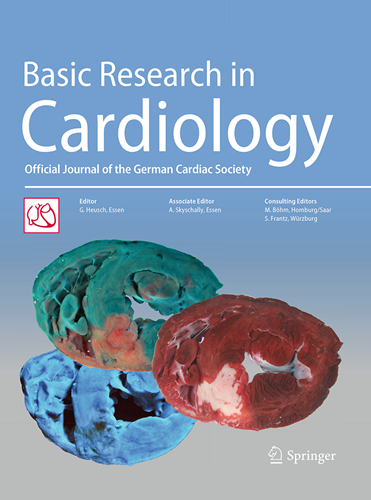Attenuation of myocardial ischemia-reperfusion injury in mice through CD80/86 deficiency: improved microvascular obstruction via reduced macrophage and T lymphocyte infiltration.
IF 8
1区 医学
Q1 CARDIAC & CARDIOVASCULAR SYSTEMS
引用次数: 0
Abstract
Microvascular obstruction (MVO) is a fundamental mechanism underlying the occurrence of no-reflow, which contributes to myocardial ischemia-reperfusion injury (MI/RI). Despite its significance, the precise pathophysiology of MVO remains incompletely understood. In this study, we aim to investigate the role of CD80/86, co-stimulatory molecules crucial for T cell activation, in exacerbating MVO during MI/RI, and elucidate their potential mechanism of action. The results revealed a significant increase in cardiac CD80/86 in mice after I/R treatment. Strikingly, the deletion of CD80/86 greatly improved cardiac function, reduced infarct size, and mitigated apoptosis 24 h after MI/R. Mechanistically, CD80/86 deletion or inhibition led to a reduction in E-selectin expression, subsequently decreasing the infiltration of macrophages and T cells, thereby counteracting MVO and ameliorating the development of no-reflow during MI/RI. In conclusion, our data highlight the crucial involvement of CD80/86 in regulating macrophage and T cells infiltration, leading to the alleviation of MVO and myocardial MI/RI. The insights gained from this study suggest that targeted inhibition of CD80/86 holds promise as a potential therapeutic strategy to protect cardiac function in patients with acute myocardial infarction undergoing reperfusion therapy. Further research in this direction could pave the way for improved treatment options in the management of ischemic heart conditions.CD80/86缺乏对小鼠心肌缺血再灌注损伤的减弱:通过减少巨噬细胞和T淋巴细胞浸润改善微血管阻塞。
微血管阻塞(Microvascular梗阻,MVO)是导致心肌缺血再灌注损伤(MI/RI)的无再流发生的基本机制。尽管其意义重大,但MVO的确切病理生理机制仍不完全清楚。在这项研究中,我们旨在研究CD80/86这一对T细胞活化至关重要的共刺激分子在MI/RI期间加重MVO中的作用,并阐明其潜在的作用机制。结果显示,I/R治疗后小鼠心脏CD80/86显著增加。引人注目的是,CD80/86的缺失极大地改善了心功能,减少了梗死面积,减轻了心肌梗死后24小时的细胞凋亡。从机制上讲,CD80/86缺失或抑制导致E-selectin表达减少,从而减少巨噬细胞和T细胞的浸润,从而抵消MVO并改善MI/RI期间无回流的发展。总之,我们的数据强调了CD80/86在调节巨噬细胞和T细胞浸润中的重要作用,从而减轻MVO和心肌MI/RI。从这项研究中获得的见解表明,靶向抑制CD80/86有望作为一种潜在的治疗策略,在接受再灌注治疗的急性心肌梗死患者中保护心功能。在这个方向上的进一步研究可以为改善缺血性心脏病的治疗选择铺平道路。
本文章由计算机程序翻译,如有差异,请以英文原文为准。
求助全文
约1分钟内获得全文
求助全文
来源期刊

Basic Research in Cardiology
医学-心血管系统
CiteScore
16.30
自引率
5.30%
发文量
54
审稿时长
6-12 weeks
期刊介绍:
Basic Research in Cardiology is an international journal for cardiovascular research. It provides a forum for original and review articles related to experimental cardiology that meet its stringent scientific standards.
Basic Research in Cardiology regularly receives articles from the fields of
- Molecular and Cellular Biology
- Biochemistry
- Biophysics
- Pharmacology
- Physiology and Pathology
- Clinical Cardiology
 求助内容:
求助内容: 应助结果提醒方式:
应助结果提醒方式:


